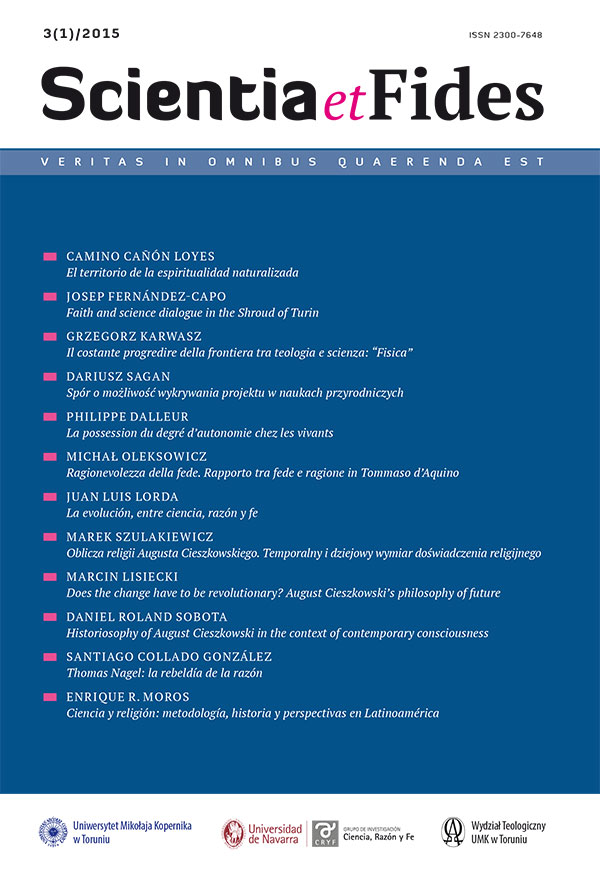Ragionevolezza della fede. Rapporto tra fede e ragione in Tommaso d’Aquino
DOI:
https://doi.org/10.12775/SetF.2015.012Keywords
natural theology, philosophy of religion, Aquinas, preambles of faithAbstract
Rationality of faith. Relationship between faith and reason in Thomas Aquinas
The rationality of the Christian faith has been an issue debated for centuries. The relationship between faith and reason is an intrinsic reality of Christian thought. But on the other hand from the beginning the Christianity it was a form of religion based on the assent of faith and not on a human justification. Here comes the heart of the problem in the relationship between Christian faith and reason, because the object of faith is not obvious. Instead, in general terms the rational knowledge is based on evidence and the principles of logic. But the act of faith, as evidenced by St. Thomas, is something more than the simple rationality: “act of the intellect gives assent to the divine truth under the influence of the will moved by God’s grace”. It is intended to demonstrate, on the basis of the thought of St. Thomas, that his position clearly can be considered as an attempt to achieve a balance covering the relationship between faith and reason. On the one hand, faith does not fall into irrationality of fideism. On the other hand, the faith in the thomistic conception has not been reduced to a form of rationalism. An attempt to read again the thomistic thought can be very fruitful to promote a dialogue between faith and reason.
References
Di Ceglie, R. 2011. Introduzione a Dio esiste. Perchè affermarlo anche senza prove. A. Plantinga. VII–XXIX. Soveria Mannelli: Rubbettino.
Di Ceglie, R. 2014. Credere in Deum. Ariccia: Aracne.
Di Ceglie, R. 2015. “Faith, reason, and charity in Thomas Aquinas’s thought.” International Journal for Philosophy of Religion (2015). Accesso: Aprile 15, 2015. Doi: 10.1007/s11153-015-9513-6.
Fabro, C. 2007. Opere Complete. Breve Introduzione al Tomismo. Vol. 16. Roma.
Fisichella, R. 1997. Quando la fede pensa. Casale Monferrato: Piemme.
Giovanni Paolo II. 1998. Fides et ratio.
Gilson, É. 2006. “What is Christian Philosophy?” In: Gilson Reader. Selected Writings of Etienne Gilson ed. A.C. Pegis. New York 1957: Garden City. Trad it. “Che cosa è la filosofia cristiana?” In: Ragione e Incarnazione. R. Di Ceglie. Città del Vaticano 2006: Lateran University Press.
Grabowski, M. 2003. Na ścieżkach współczesności. Kraków.
Livi, A. e Silli, F. 2007. Logica della testimonianza. Quando credere è ragionevole. Roma.
Livi, A. 2008. “L’essenza razionale del cristianesimo”. Studi cattolici 52 (2008): 324–330.
McInerny, R. 2006. Preambula fidei. Thomism and the God of the Philosophers. Washington DC: The Catholic University of America Press.
Pangallo, M. 2004. Il creatore del mondo. Breve trattato di teologia filosofica. Roma.
Plantinga, A. 2011. Dio esiste. Perchè affermarlo anche senza prove. Trad. it. di Reason and Belief in God a cura di R. Di Ceglie. Soveria Mannelli: Rubbettino.
Ratzinger, J. “La verità cattolica.” Trad. it. Micromega 2 (2000): 41–64.
Tommaso d’Aquino. 1985. Summa Theologiae [nel testo: ST]. Edizioni Studio Domenicano. Bologna.
Tommaso d’Aquino. 1997. Super Boethium De Trinitate. A cura di C. Pandolfi, Edizioni Studio Domenicano. Bologna.
Tommaso d’Aquino. 2000. Summa Contra Gentiles [nel testo: CG]. A cura di T.S. Centi, Edizioni Studio Domenicano. Bologna.
Downloads
Published
How to Cite
Issue
Section
License
Copyright (c) 2015 Scientia et Fides

This work is licensed under a Creative Commons Attribution-NoDerivatives 4.0 International License.
CC BY ND 4.0. The Creator/Contributor is the Licensor, who grants the Licensee a non-exclusive license to use the Work on the fields indicated in the License Agreement.
- The Licensor grants the Licensee a non-exclusive license to use the Work/related rights item specified in § 1 within the following fields: a) recording of Work/related rights item; b) reproduction (multiplication) of Work/related rights item in print and digital technology (e-book, audiobook); c) placing the copies of the multiplied Work/related rights item on the market; d) entering the Work/related rights item to computer memory; e) distribution of the work in electronic version in the open access form on the basis of Creative Commons license (CC BY-ND 3.0) via the digital platform of the Nicolaus Copernicus University Press and file repository of the Nicolaus Copernicus University.
- Usage of the recorded Work by the Licensee within the above fields is not restricted by time, numbers or territory.
- The Licensor grants the license for the Work/related rights item to the Licensee free of charge and for an unspecified period of time.
FULL TEXT License Agreement
Stats
Number of views and downloads: 793
Number of citations: 1



